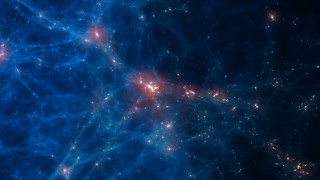Bibcode
Di Cintio, A.; Brook, C. B.; Dutton, Aaron A.; Macciò, Andrea V.; Obreja, Aura; Dekel, Avishai
Referencia bibliográfica
Monthly Notices of the Royal Astronomical Society: Letters, Volume 466, Issue 1, p.L1-L6
Fecha de publicación:
3
2017
Número de citas
276
Número de citas referidas
247
Descripción
We address the origin of ultra-diffuse galaxies (UDGs), which have
stellar masses typical of dwarf galaxies but effective radii of Milky
Way-sized objects. Their formation mechanism, and whether they are
failed L⋆ galaxies or diffuse dwarfs, are challenging
issues. Using zoom-in cosmological simulations from the Numerical
Investigation of a Hundred Astrophysical Objects (NIHAO) project, we
show that UDG analogues form naturally in dwarf-sized haloes due to
episodes of gas outflows associated with star formation. The simulated
UDGs live in isolated haloes of masses 1010-11
M⊙, have stellar masses of 107-8.5
M⊙, effective radii larger than 1 kpc and dark matter
cores. They show a broad range of colours, an average Sérsic
index of 0.83, a typical distribution of halo spin and concentration,
and a non-negligible H I gas mass of 107 - 9
M⊙, which correlates with the extent of the galaxy. Gas
availability is crucial to the internal processes which form UDGs:
feedback-driven gas outflows, and subsequent dark matter and stellar
expansion, are the key to reproduce faint, yet unusually extended,
galaxies. This scenario implies that UDGs represent a dwarf population
of low surface brightness galaxies and should exist in the field. The
largest isolated UDGs should contain more H I gas than less extended
dwarfs of similar M⋆.
Proyectos relacionados

Astrofísica Numérica: Formación y Evolución de Galaxias
Entre las cuestiones fundamentales en Astronomía y Astrofísica están la formación y evolución de galaxias. Las escalas de tiempo y tamaño son tan astronómicas que su observación en galaxias individuales es imposible. Solo con el uso de simulaciones numéricas es posible entender la formación de estructuras cósmicas dentro del actual marco
Claudio
Dalla Vecchia